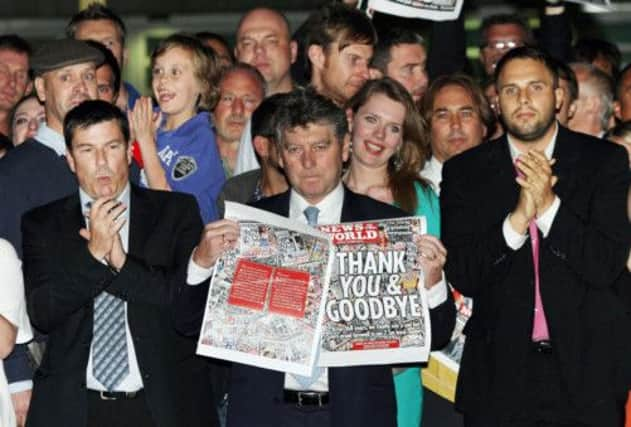Christine Jardine: Press charter ticks right boxes


They will be the future of the media. Their perceptions of right, wrong and what is ethical will drive the industry’s approach into the middle of the 21st century.
Crucially, the current crop of journalism students will be the first to embark on a career in a post-Leveson workplace, their futures inextricably linked to the outcome of the current power struggle over how their output will be regulated.
Advertisement
Hide AdAdvertisement
Hide AdWorking with them last week, it was too much of a temptation not to ask their opinion: press proposals or politicians’ Royal Charter?
Not surprisingly they were as uncompromising on the need for freedom of the press as we had been as students.
They are appalled by what they see as bad journalism and as committed as previous generations to an ethical approach.
But their belief that the efficacy of strong journalism and the integrity of the profession could only be protected by self-regulation was, for me, a disappointment.
Not because I lack any confidence in their commitment to strong ethical journalism.
But precisely because I see their idealism and determination, and fear they will be let down in the same way as previous generations.
The arguments offered by those convinced the press’s own proposals should win out were ones I know well.
I’ve made them myself in the past. I’ve argued that self-regulation was the only guarantor of freedom of the press.
Advertisement
Hide AdAdvertisement
Hide AdI’ve defended the Press Complaints Commission as the appropriate arbiter of behaviour.
And I’ve pointed out that there are already laws to prevent such things as phone hacking, harassment and writing lies about people.
But that was in the wake of Calcutt and in the 20 years before Leveson.
The Calcutt inquiry had been set up at the end of the 1980s “to consider what measures (whether legislative or otherwise) are needed to give further protection to individual privacy from the activities of the press and improve recourse against the press for the individual citizen”.
The Press Council of the 1950s was regarded as no longer effective. So as a result we had the Press Complaints Commission. And for a while it worked. But here we are again.
Another generation has offended the public, abused the privilege of self-regulation and now expects them to have faith that we can clean it up and police the industry ourselves.
This time I am not so sure. The events of two summers ago and the unacceptable attitudes and abuse of press power by some have undermined my faith that we can always be trusted.
I feel the fact that those words about Calcutt, written more than two decades ago, have resonance today should worry us.
Advertisement
Hide AdAdvertisement
Hide AdAnd this time I think there is an alternative: the politicians’ Royal Charter.
There has been a lot of hyperbole in the media about this being the end of freedom of the press; that they have cleaned up the industry before and they will do it again.
But surely that both ignores the reality of repeated failure to do so and misleads us all about what is actually being proposed.
And perhaps most importantly, it does not give the politicians credit for recognising the value of a free press.
When Nick Clegg took the unprecedented step in this coalition of making a separate statement from the Prime Minister, it was surely because he recognised the significance of the discussion that was about to take place?
And surely we should remember that the resultant cross-party agreement had not grown out of a political policy forum, but was a response to a plea from ordinary people who felt their lives had been blighted by journalists out of control.
We also now know that, regardless of how it is being portrayed, what our politicians are proposing is not some legislative straitjacket to silence criticism of them.
Neither is it an attack on the industry’s ability to police itself. And we are not being singled out for some draconian punishment from which other professions are exempt.
Advertisement
Hide AdAdvertisement
Hide AdWhat we are being offered is a new watchdog which will be independent of both the government and the industry.
What the politicians envisage is similar to the set-up currently affecting professionals who are responsible for our health and wellbeing. Lawyers, doctors and dentists are all subject to self-regulation overseen by an independent body.
No-one, so far as I am aware, is suggesting this somehow impacts on their ability to provide the public with a robust, trustworthy and effective service.
Moreover, it also protects both the public, and good ethical professionals, from the excesses of the few who could abuse a position of trust.
Judged against that background, the fears expressed by those who champion the proposals of the press themselves sound, to me, unreasonable.
I do not doubt their commitment to an ethical approach or their belief that the majority of our colleagues share the same determination.
And I am confident that what motivates them is the desire to ensure that authority is held to account and freedoms protected.
But they must surely recognise that in that, at least, the current regime, and by implication, the whole principle of self-regulation has failed.
Advertisement
Hide AdAdvertisement
Hide AdListening to those students last week I was reassured that the future of our industry is in safe hands.
But I have listened to other generations espouse admirable principles and an ethical approach.
I have seen determined journalists uncover outrageous abuses of power and miscarriages of justice.
And I have seen them let down by a system that could not guarantee that everyone in the industry would abide by the same rules.
We cannot let another generation be let down, and in turn let down the public, through our blinkered belief that only we are somehow above independent scrutiny.
We owe them both something better.